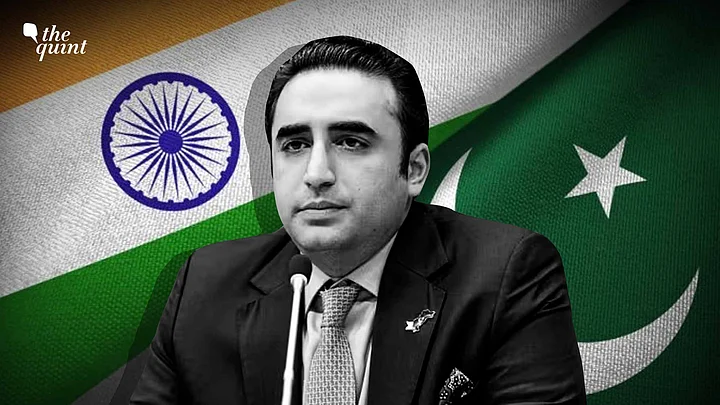Intense interest has built around Pakistan Foreign Minister Bilawal Bhutto’s Goa visit for the Shanghai Cooperation Organisation(SCO) meeting in India. The question all observers are focusing on is whether this visit will throw up any bilateral talks, though they are not scheduled, and whether the relationship will take any new direction for better or worse, or whether things will remain the same.
As India's EAM S Jaishankar welcomed the FM, what are the chances of the latter's visit to India after 12 years of a difficult relationship, and a recent exchange of name-calling by the two counterparts (terrorist / fascist-butcher), of mending any ties?
Prospect of Bilateral Talks Mustn’t Be Benched
For Pakistan, the event is of prime importance because of the regional/ multilateral nature that it cannot afford to lock itself out of. The SCO is led by China, a long-time ally of Pakistan. Russia is an important regional player, with Turkey and KSA having shown interest in joining, and with many Central Asian states already its members. So Bhutto’s attendance should not be looked at with surprise. Indeed, it would have been seen as churlish and an act of self-harm by Pakistan had she decided not to send her FM in person.
But I disagree with the conventional analysis that given the political sensitivities in both countries, especially with general elections coming up for both, neither country would or should want to conduct any bilateral meeting because of its potential political cost, domestically. And even though Bhutto has tried to manage expectations, or pre-empt any criticism that he failed, by pointing out that SCO doesn’t permit bilateral engagement on its platform, it remains that there is no bar on conducting bilateral dialogue on the sidelines of the main moot. And one would, therefore, expect many such sideline meetings to be taking place, but perhaps not one between India and Pakistan.
My disagreement with this analysis is based on the reading of the political shift at least in Pakistan. The military establishment appears to have not just come to a new realisation, but also appears to be more honest in admitting the good relations with neighbours, in this case, India is in Pakistan’s interest.
Former Army Chief General Bajwa is indeed, on record, as having said this on several occasions. He has spoken of a shift from geo-strategic to geo-economic, of regions flourishing not countries in silos. And where the people or voters' reactions are concerned, I believe it was always a false narrative, a construct, that good relations will damage the political and electoral prospects of politicians.
‘India Is in Pakistan’s Interest’
For the longest time now, especially after Benazir Bhutto’s passing away, Nawaz Sharif has been the most popular politician in Pakistan who managed to become the PM for a third time—and his policy towards India was always one of friendship, trade, and people to people contact, and so forth.
Even among the common people, the understanding is fairly clear that peace and a mutually beneficial relationship are in their interest. So, the sooner political parties understand this, the better. Kashmir is a thorny issue, but it has dawned on the common man, that the economic prosperity and the clout that accrues from it can be the only possible way forward and not aggression.
Having said all this, there is much talk in India of Bhutto’s recent strong language in the UNGA with liberal use of the word "fascist" and especially, ‘Butcher of Gujarat’ for PM Modi. But to put that in perspective, I found that very un-Bilawal-like. I normally find his words to be well chosen and tends to deliver even barbs very elegantly to his political adversaries. And in all due fairness, those remarks came in direct response to External Minister Subramanyam Jaishankar’s earlier remarks about calling Pakistan "the epicenter of terrorism."
Now the Pakistan Army may have understood the need for good relations with India belatedly, but if there is one thing it has not overcome, perhaps understandably, is its institutional ego. Therefore, my strong suspicion is that Bilawal was put up to that repartee.
And to an extent, I understand his compulsion in going along with that as the traditional political parties’ relations with the Pakistan Army have come out of the freezer after a long time. Perhaps, I would have done that too, expecting the other side to understand that I was playing to the domestic gallery since it is vital for democracy and normalcy in Pakistan to not have the Army at the throat of the democratic process once again in Pakistan. And once some stability and strength in that area have been ensured, a more magnanimous or diplomatic course can be followed.
And as far as the new Pakistan Army Chief is concerned, and how much I have observed him, I think he will stay the course of peace with India if he can help it. He’s a man of few words, but from the few visible actions he has taken, and the direction that has started to become visible, I expect him to let the politicians decide policy and decide and take the country’s strategic direction forward with his support, which he sees as his constitutional role.
The ball, it is very apparent now, is in India’s court.
(Gul Bukhari is a Pakistani journalist and rights activist. She tweets @GulBukhari. This is an opinion article and the views expressed are the author’s own. The Quint neither endorses nor is responsible for them.)
